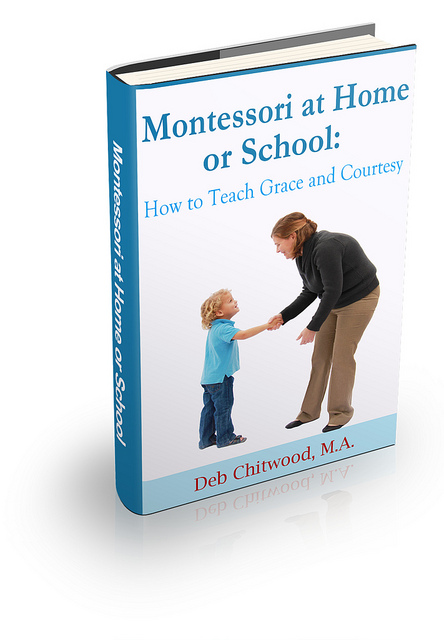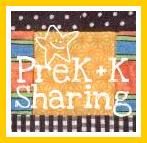
I wrote before about one of the inner aids – the young child’s “absorbent mind.” Another inner aid is what Maria Montessori called “sensitive periods.”
Sensitive periods are blocks of time when a child is almost exclusively absorbed with one characteristic of the environment. When a sensitive period is at its height, your child might appear to be obsessed with an activity, repeating it over and over. Repetition is a good sign that your child is fulfilling an important need in his or her development. During a sensitive period, new skills in that area are learned almost effortlessly.
Disclosure: This post contains some affiliate links (at no cost to you).
In The Secret of Childhood, Dr. Montessori wrote about sensitive periods:
The inner sensibilities we have mentioned determine the selection of necessary things from a many-faceted environ ment, and of circumstances favourable to development. This guidance is exercised by making the child sensitive only towards certain things, leaving him indifferent towards others. When he is sensible of something, it is as if a light came from him, illuminating that and no other, and of such things his world is made.
Here are some common sensitive periods during the early years. The exact ages, of course, can vary from child to child.
Birth-1½
*Movement
Birth-6
*Language with a sensitivity to vocal sounds. From 1½ -3, there’s often a “language explosion” and a receptivity to proper terminology from 2½-3. The sensitive period for language continues from 3-6, with the child showing an insatiable need to learn new words, including scientific terms.
1½-4
*Interest in small objects and details
2-4
*Refinement of movement
*Concern with truth and reality. To aid this sensitive period, answer your child’s questions honestly, and provide real, child-sized tools whenever possible.
*Order (with a peak at 3). An orderly environment is important because it helps your child develop internal order.
2½-6
*Refinement of the senses
*Grace and courtesy
3½ -4½
*Writing
*Drawing or handling geometric shapes
4½ -5½
*Reading
PREPARING MONTESSORI SPACES IN YOUR HOME
See “How to Create a Montessori-Friendly Home” for ideas for a number of levels. Here are some of my main home environment posts here:
- How to Prepare a Montessori Baby Room at Home (roundup post)
- How to Prepare a Montessori Toddler Environment at Home (roundup post)
- Preparing a Montessori Newborn Baby Space at Home
- How to Use Montessori Mobiles to Encourage a Newborn Baby’s Development and Delight
- Preparing a Montessori Baby Space with Shelves at Home
- Preparing a Montessori Baby Space in Your Living Room
- Preparing a Montessori Baby-Toddler Space at Home
- Preparing Montessori Toddler Spaces at Home (includes my Montessori toilet learning setup)
- How to Prepare Montessori Shelves for a 2 Year Old
- How to Prepare Montessori Shelves for a 2½ Year Old
- How to Prepare Montessori Shelves for a 3 Year Old
- How to Prepare Montessori Shelves for a 3½ Year Old
- How to Prepare Montessori Shelves for a 4 Year Old
- How to Prepare Montessori Shelves for a 4½ Year Old
- How to Prepare Montessori Shelves for a 5 Year Old
- How to Prepare Themed Montessori Shelves
- How to Prepare a Montessori Home Environment for Afterschooling
- Create an Attractive Home Environment from Montessori at Home!
- How to Set Up a Montessori Homeschool Classroom
- How to Prepare Montessori Homeschool Spaces for Babies through First Graders
- How to Prepare a Montessori Space in Your Living Room for Toddlers Through Early Elementary
See my Montessori Resources Page for many more Montessori posts and links.

The Montessori at Home! eBook and Montessori at Home! eBook and Materials Bundle are AMAZING resources! You can learn more about them here. Buy them in the Living Montessori Now shop.
If this is your first time visiting Living Montessori Now, welcome! If you haven’t already, please join us on our Living Montessori Now Facebook page where you’ll find a Free Printable of the Day and lots of inspiration and ideas for parenting and teaching! And please follow me on Pinterest (lots of Montessori-, holiday-, and theme-related boards), Instagram, and YouTube. You can find me on bloglovin’ and Twitter, too.
And don’t forget one of the best ways to follow me by signing up for my weekly newsletter. You’ll receive some awesome freebies in the process!






Another post to save in my favorites. Thanks for the break down by ages, that is really helpful!
Thanks so much, Michelle! I’m really glad you found it helpful!
This is a very clear explanation and such a helpful post! I also really appreciate that you broke things down by age. Thanks so much!
Leslie
Thanks for your kind comment, Leslie! Even though the ages can vary, I always found it helpful to have somewhat of a guideline, too.
This is always so interesting to me. I try to take some time a few times a week to observe her, and I’ve noticed she is really obsessed with routine. She delights in telling me what’s going to happen next, and to tell me what I’m supposed to say next. She also is really interested in trying to dress and undress herself, and she wants no instruction from me! It’s hard to watch her struggle to get her shirt over her head, failing over and over, but I can tell she’s close to getting it!
Thanks, Laura! It’s great that you’re spending time just observing Georgia! It sounds like she’s definitely in her sensitive period for order! And it’s wonderful you’re allowing her to develop coordination and independence through tasks such as dressing herself.
Great information! My youngest is a little “behind” but I know these are guidelines.
Thanks, Cheryl! The exact ages can definitely vary from child to child. It’s helpful to be aware of the general order for the sensitive periods, though. For example, it helps to know that the sensitive period for writing typically comes before the sensitive period for reading.
Great list. I love how it is broken into ages like that. I will help me to look for those things in my kids.
Thanks so much Jackie! I hope you find it helpful with your kids!
Hi, Deb: Are there sensitive periods regarding relationships? My 2.5-yo boy is obsessed with babies these days — real babies, baby dolls, pictures of babies, holding things (including his Lego fire truck) as though they were babies, being held as though he were a baby…. His teacher (he goes to a Montessori preschool) said something about his having a “sensitive period” for babies — I hadn’t thought about that before! Thank you!
Thanks for your comment, Rachael! I haven’t heard about a sensitive period specifically for babies or seen one talked about online, although I imagine children can go through their own unique “sensitive periods.” If you’re following your son’s interest in babies, you can’t go wrong!
My daughter is 40 months old and she loves to sort things into categories. This morning she sorted all of the spoons from the silverware drawer (baby spoons made of plastic, baby spoons made of metal, teaspoons, etc). Then she sorted all of the digital thermometers! Weird, huh?!? 🙂
I understand this is a list to understand the general order of development, so my question might not be relevant. When you list an age span, from 2-4, does that mean the senstitive period spans until around the 4th birthday or spans to almost the 5th birthday?
My daughter is 11 months, so I suppose I can wait and see! I’m excited that she has started pointing to objects and starting to communicate, mostly non-verbal, at this point. I’ve been trying to teach her sign language, but so far, she’s not taking much interest. She uses the word “uh oh” for dropping things and for when she sees something out of place!
Thanks for sharing your knowledge on this site!
Hello!
This is a really interesting post. My daughter is now 21 months old. A bit after her first birthday, she was really focused on books. She would bring me books to read all day long and I was kind of confused; how could books be more interesting that playing? This lasted about a month and then she started talking! At 16 months old she was trying to make sentences and now she tells amazing things. So thanks for explaining to me what was happening in her mind and letting me know that there will be more of these “strange fixations”.
I was wandering, could I please translate this post in Greek and put it on my blog? Of course there will be credit to you and a link to this site and your facebook page.
Greetings from Athens
Antonia